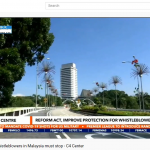Topic: Whistleblower Protection
Related news: https://www.youtube.com/watch?v=fc0mimCDeEU&t=112s
Coverage by: Astro Awani
There is a profound need for reforms to be undertaken to the current Whistleblower Protection Act 2010 to encourage a culture of whistleblowing in Malaysia.
Speaking to Astro Awani, Center to Combat Corruption and Cronyism (C4 Center) programme director Sudhagaran Stanley said amendments to the WPA 2010, in particular Section 6 (1), to allow whistleblowers to lodge complaints to other parties (i.e: media organisations, lawyers or civil society organisations) apart from the Malaysian Anti-Corruption Commission (MACC) and official enforcement agencies listed under the Act, should be pursued to ensure that whistleblowers’ right to protection is not revoked.
An attitude of whistleblowing among the Malaysian society, he said, must be encouraged.
“The persecution of whistleblowers in this country must stop. We cannot go after whistleblowers because that sends a wrong message out to the people,” Stanley said.
“By arresting and investigating or even charging whistleblowers in the country puts off other potential whistleblowers who want to come forward and blow the whistle.
“They would be scared that they might be targeted and end up in court and so on,” he pointed out.
In the interview, Stanley also highlighted about the need to disallow Executive interference in the enforcement of the Act, particularly concerning Section 4 and 27.
“Currently, Section 4 which gives power to the minister to issue directions and Section 27 which (provides) the power to the minister to make regulations — these need to be removed.
“We cannot allow a minister to give direction to enforcement agencies about what and what not to do.
“We cannot allow government interference in the enforcement of the Act,” he said adding that an independent body to decide the eligibility of protection for whistleblowers under the WPA 2010 should be in place.
The Whistleblower Protection Act 2010 [Act 711] was passed in Parliament on May 6, 2010.
In November 2020, the Legal Affairs Division of the Prime Minister’s Department Research and Policy director Punitha Silivarajoo revealed that the law is under review.
Once the necessary consultation is done with NGOs, civil society organisations and government-linked companies, she said the public will be able to weigh in on the recommendations.
The failures under the current Act has created a “trust deficit” among the public and discouraged those with important information from coming forward out of fear of internal or legal repercussions, Punitha said during a presentation organised by C4 Center titled “Breaking the Chain of Corruption: Whistleblowers Vital to Break the Chain of Corruption. Is There Protection?”.





